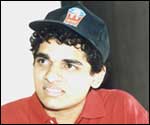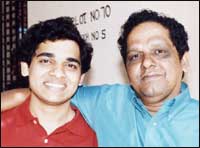The Rediff Interview / Krishnan Sasikiran
'My strength is in the middle game. But I have to improve
a lot in the end games'
Shobha Warrier
It was Sunday, a holiday, but that was the only day Krishnan Sasikiran was free to meet me. After he won the National A chess championship, it was celebration time at home.
An hour-long journey on bumpy, potholed roads took me to the 20-year-old Grandmaster's house in the suburbs of Chennai. His house was full of guests and more were pouring in. We decided to sit outside under a tree and talk. Though an introvert, he talked for nearly an hour, though one had to prod a lot to get answers.
Excerpts:
Congratulations on winning the National A championship. You have just won three titles in row: the AICF Golden Jubilee GM tournament, Hastings and now National A. What were your expectations when you went to play these tournaments?
To tell you the truth, I did not expect anything at all. My only aim was to pick up some Elo points. Basically, I wanted to cross 2600 badly.
I do not know why I play more solidly at Hastings. Maybe, because it was category 10 and 11 tournaments. And, I picked up 12 Elo points there. Of course, I was a joint winner there with [Pendyala] Harikrishna and Tahir Vakhidov of Uzbekistan.
 That was the first win of this year. How did you celebrate?
That was the first win of this year. How did you celebrate?
There was no celebration at all. In fact, there was no time. I had to start preparing for the next tournament immediately after.
It is said that this yearís Nationals was the toughest in its 39-year-old history. Did you also feel the same?
I would say all the national championships that I have played so far have been tough. As there are 19 rounds, it is a very lengthy tournament. So, you cannot afford to make mistakes. It tests your stamina also. Anyway, I am happy that I have won it decisively this time! Not a joint winner this time! As you know, the last time I won the nationals was in 1999. I was a runner-up in 2000 and 2001.
Dibyendu Barua and Harikrishna were leading most of the time. Were you tense then?
Yes, they were leading in the beginning. But that did not affect me at all.
You said after the match that you lost your confidence after losing to [Pravin] Thipsay in the 7th roundÖ
Yes, I really lost confidence after losing that match to Thipsay. I do not know what exactly happened in the round. It happens to all people at times. It was just a blunder. But what worried me was even after playing chess for such a long time, I made such an atrocious move; a real blunder. The disturbing aspect is that I make such blunders in all the tournaments, at least in one game. The same thing happened at Calicut (the AICF) against Abhijit [Kunte]. It was a slightly difficult position; still in hindsight, I felt I could have defended. I should reduce these blunders! I should study more tactics. Maybe, after a few more years, I will develop an intuition.
Could you sleep after that defeat?
I could. I ate well (laughs) and slept well too! Generally, I try to forget such setbacks. When I go to play in the morning, I do not think of what I had done the previous day.
After I won my tenth round match against Abhijit, I became confident. After that, I knew I could continue playing without making blunders.
The much-awaited match was the 13th round match between you and Harikrishna. The 125-move match turned out to be one of the longest. Was it very exhausting?
It was exhausting. Our earlier match at Hastings was a draw. But here, I defeated him. He made a dubious move in the opening, and he was a pawn down. But I didnít continue it well. So, it moved as if it was going to be a draw. Finally, I managed to win. It was a very tough game. Towards the end, both of us were under tremendous tension as we made those moves under pressure because of lack of time. I think I had only a few seconds left when I made the queen check.
There is a six-year gap between you and Harikrishna, and you must have seen him as a small boy too. How much has he improved over the years?
He has improved by leaps and bounds after he got his Russian coach. He is continuing coaching with him. I think, in the last one year, he hasnít lost a single match with white pieces. His white percentage will be around 80 per cent. It's amazing. He is a very tough man to beat.
Do you think it was because he started going all around the world from a very young age that he has become so tough? Is it not true that you didnít get this kind of exposure at a young age?
In my case, my career started quite late. I started playing only at the age of ten. Ten is actually a very late age to start. I feel you should start at five itself. No, I am not complaining. I am also getting opportunities.
In the case of Harikrishna, I am sure he became strong after he started being coached by Vladimir. He is a highly experienced player, a 2600 (Elo points) GM. So, he would be coaching Hari very well. In the gap of one year, Hari has moved from 2350 to 2500. That is a big jump, and it is due to the coaching that he gets. I donít think it was because he played so many tournaments. It can happen only because he is playing with a 2600 GM.
Are you also trying to get a Russian coach?
I am trying to get a foreign coach; I am trying.
Do you have plans to move to Europe like Anand did?
No, no. See, he plays at a different level. It is easier for him because all the big tournaments are in Europe. But in my case, it is different. Okay, Madras is a bit hot, and it is not the best climate for preparations. Maybe, a place like Bangalore is better; I don't know.
 What is the Elo rating that you are targeting?
What is the Elo rating that you are targeting?
I want to cross 2700, but it will take time, I think. There is a lot of difference between 2600 and 2700. At present, I will have to stabilize on 2600, and then try to move ahead.
When you entered the chess scene, you were a sensation after Anand. Then came Humpy and Harikrishna, and the attention has shifted from you to them...
Thatís because they are young. When you start performing at a very young age, you get sponsors easily. I am not complaining. My employers are ONGC and they take care of everything, like my travel and stay when I go abroad. They are more like my sponsors. I don't have to go to the office at all. I stay at home and prepare.
Which was the most memorable tournament of your career?
Goodrich 2000. That was the first time I felt I have improved and I am strong. I felt I could comfortably be a GM. The Commonwealth was the best tournament that I have won.
Some analysts say that you have to improve your opening. What according to you are your strengths and weaknesses?
I donít think my opening is weak, but there is not much depth. I play around 4 or 5 openings only. So, there is not much of depth. My strength is in the middle game. But I have to improve a lot in the end games. I have to improve both openings and end games.
How do you keep yourself fit?
When I am at home, I go to the gym. I have been going to the gym from October last onwards. I think there is an improvement in my game after that.
But when we go for tournaments, we play badminton, we swim, and we do so many things.
On an average, how many tournaments would you like to play in a year?
I generally play around 10-12 tournaments. Not more than that. There is no point in playing so many tournaments without much preparation. I like to prepare well before any tournament. I choose tournaments on the basis of Elo ratings only. Every chess player wants to improve his Elo rating.
After Anand became a well-known international chess player, there are a lot of young chess players in India, and they are making their mark on the international scene too. Are you also influenced by Anand?
Of course, it is only because of Anandís success that we have so many chess players from India. It is only because of him that people now feel you can choose chess as a profession.
In my case too, Anand is an influencing factor. Then, my father plays chess. I picked up chess seeing him play chess with his friends.
When you had to make a choice between academics and chess, you chose chess. Was it a tough decision?
After I finished my tenth standard, it was my father, rather the three of us - my father, my mother and myself - who decided that I concentrate on chess. It was not a very difficult decision because my father was confident. Yes, it was a risky decision.
Then, I played chess for a year, and came back to study but then I got a sponsor, DSQ Software. They sponsored me in the year 1997-98. I had good results in that year. After I got my GM title in London, I decided to continue playing chess again. Now, I am doing BBA by correspondence.
What is your ambition as far as chess is concerned?
I want to reach 2700. I do not know how long it will take. I don't think it is realistic to aim at the World Championships. If you do not have more than 2750, you should not aim such things! It is not realistic at all. I can think about World Championships after I increase my strength. It will be wishful thinking if I were to say my ambition is to be the World champion!
Whom do you admire in the field of chess?
I admire Anand, [Garry] Kasparov and [Vladimir] Kramnik. I admire Kasparov for the opening preparations that he makes. I donít think anybody has reached his level. He has a great opening! I admire Anand for his speed. He has a fantastic memory. I would say Anand is a genius. I admire Kramnik for his universal style.
Phorographs: Sreeram Selvaraj
More interviews